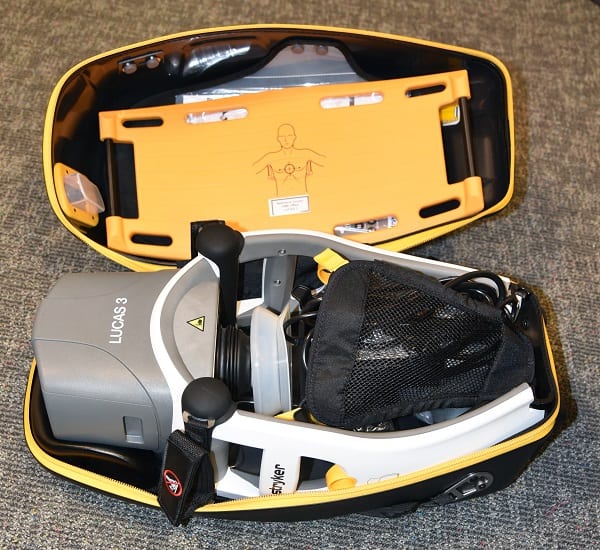BALTIMORE COUNTY, MD—The Baltimore County Fire Department has invested $720,000 in automatic CPR devices – enough to equip every career and volunteer medic unit.
These LUCAS Chest Compression System machines perform cardiopulmonary resuscitation automatically and at an optimal pace. They will be placed in the field this week on medic units that do not already have them.
The Department purchased 48 LUCAS devices ($15,000 each) with federal Coronavirus Aid, Relief and Economic Security Act (CARES) funding.
“Safety for our personnel is a top priority, especially during the pandemic,” said Fire Chief Joanne Rund. “LUCAS devices allow more space between patients and EMS providers. Also, ambulance rides are safer for crews if they do not need to perform CPR in a moving vehicle.”
Prompt, properly performed CPR chest compressions are a critical lifesaving measure for patients in cardiac arrest. The American Heart Association says that immediate CPR can double or triple chances of survival after cardiac arrest.
In adult victims of cardiac arrest, it is reasonable for rescuers to perform chest compressions at a rate of 100 to 120 per minute, to a depth of at least 2 inches. That can be a tiring task for EMS providers.
LUCAS devices prevent loss of an optimal compression rate due to tiring. They are widely used among fire departments and emergency medical providers across the nation and have been proven to enhance significantly positive patient outcomes.
BCoFD’s LUCAS devices are compatible with Bluetooth technology. EMS providers are able to see real-time data showing the effectiveness of the automatic compressions.
Rich Schenning, BCoFD’s EMS Director, said that cardiac arrest is “among the most critical and common calls we handle” and stressed that CPR is one of several critical links in the “Chain of Survival”” for cardiac arrest patients:
- Recognition of cardiac arrest and calling 911
- Early CPR with an emphasis on chest compressions
- Rapid defibrillation
- Advanced resuscitation by Emergency Medical Services and other healthcare providers
- Post-cardiac arrest care
- Recovery
Do you value local journalism? Support NottinghamMD.com today.

